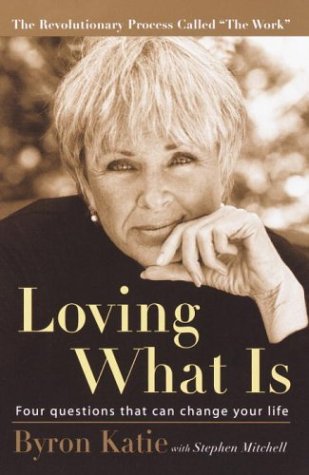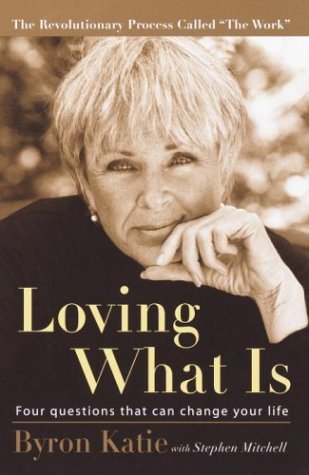
Out of nowhere, like a breeze in a marketplace crowded with advice, comes Byron Katie and “The Work.” In the midst of a normal life, Katie became increasingly depressed, and over a ten-year period sank further into rage, despair, and thoughts of suicide. Then one morning, she woke up in a state of absolute joy, filled with the realization of how her own suffering had ended. The freedom of that realization has never left her, and now in Loving What Is you can discover the same freedom through The Work.
The Work is simply four questions that, when applied to a specific problem, enable you to see what is troubling you in an entirely different light. As Katie says, “It’s not the problem that causes our suffering; it’s our thinking about the problem.” Contrary to popular belief, trying to let go of a painful thought never works; instead, once we have done The Work, the thought lets go of us. At that point, we can truly love what is, just as it is.
Loving What Is will show you step-by-step, through clear and vivid examples, exactly how to use this revolutionary process for yourself. You’ll see people do The Work with Katie on a broad range of human problems, from a wife ready to leave her husband because he wants more sex, to a Manhattan worker paralyzed by fear of terrorism, to a woman suffering over a death in her family. Many people have discovered The Work’s power to solve problems; in addition, they say that through The Work they experience a sense of lasting peace and find the clarity and energy to act, even in situations that had previously seemed impossible.
If you continue to do The Work, you may discover, as many people have, that the questioning flows into every aspect of your life, effortlessly undoing the stressful thoughts that keep you from experiencing peace. Loving What Is offers everything you need to learn and live this remarkable process, and to find happiness as what Katie calls “a lover of reality.”
From the Hardcover edition.Remember the phrase “question authority”? Loving What Is is a workbook on questioning authority–but in this case, what is in question is the authority of our own fundamental beliefs about our relationships.
Known simply as “The Work,” Byron Katie’s methods are clean and straightforward. The basis is a series of four questions addressed to your own lists of written assumptions. Whether you’re angry with your boss, frustrated with your teen’s behavior, or appalled at the state of the world’s environment, Katie suggests you write down your most honest thoughts on the matter, and then begin the examination. Starting with, “Is it true?” and continuing with explorations of “Who would you be without that thought?” this method allows you to get through unhelpful preconceptions and find peace. An integral part of the process is “turning the thought around,” and at first this can seem like you’re simply blaming yourself for everything. Push a little harder, and you’ll find a very responsible acceptance of reality, beyond questions of fault and blame.
The book is filled with examples of folks applying The Work to a variety of life situations, and reading other’s examples gets the idea across pretty clearly; chances are you’ll find your own frustrations echoed on the pages a few times. Many chapters are divided into specific topics, such as couples, money, addictions, and self-judgments, with one chapter devoted to exploring the method with children.
Questioning your own authority is never an easy process, but it seems well worth the potential rewards–stress-free choices, peace, and affection for those closest to you. –Jill Lightner

